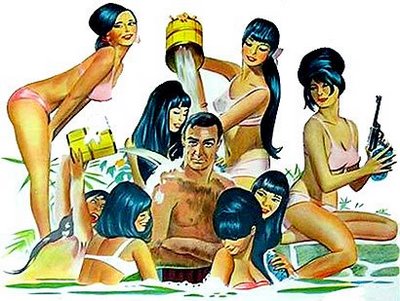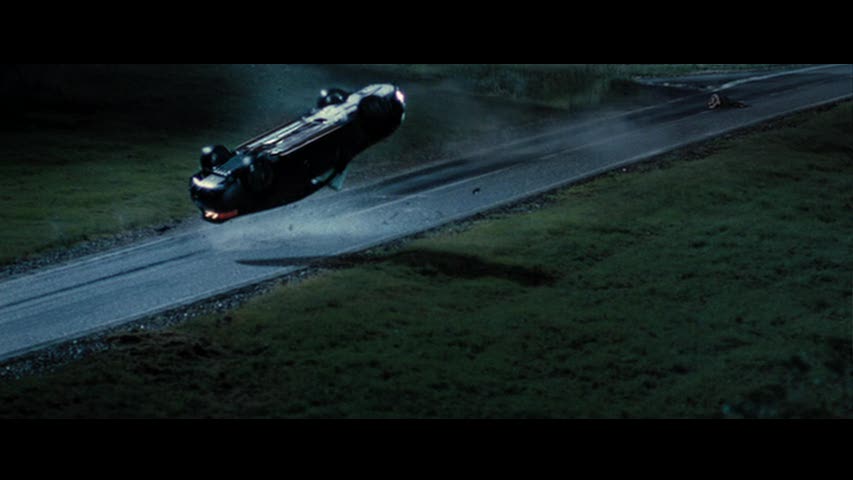I am something of a Bond fanatic. At one point I owned all of the films on VHS and tirelessly rewatched my favourites time after time. When I was ten I watched all sixteen Bond films over the course of a weekend in anticipation of the soon to be released Goldeneye. As I got older I became more discriminating in taste, the crushing tedium of The World is Not Enough and superficial banality of Die Another Day curb stomping my appreciation of the series as a whole. Nowadays I can admit to liking about half of the films produced in the series and own only six of them on DVD or Blu-Ray. Despite this I still like James Bond more than any other film series.
As such the announcement that the 23rd Bond film would begin production to coincide with the 50th Anniversary of the release of Doctor No. in 2012 caused me to do three things.
1. Watch the earlier collaboration between director Sam Mendes and star Daniel Craig, The Road to Perdition
2. Wonder why I had bothered to watch The Road to Perdition
3. Think about why I was pleased that Craig would continue to play James Bond.
To answer question three I started to think about each actor who had played Bond in the main series (sorry David Niven!). As such read on to find out my thoughts on perhaps the most discussed fictional character since Jesus Christ.
Sean Connery
The old adage is that you are either a fan of Sean Connery’s Bond or Roger Moore’s Bond. Certainly Connery and Moore represent the extremes of the character, Connery ice-cold and brutally efficient, Moore foppish and razor witted. Connery is the archetypal Bond and a big part of why I love him in the role is that he seems at odds with the world that is built around the character. The first Connery films are fairly lean and mean affairs, low on gadgets, sparing with action, and largely built around intrigue and deceit. As the series moved on and became increasingly focused on large scale set pieces, affected villains, and a general sense of the fantastic Connery was a grounding presence. Connery who played Bond as bemused by a knife secreted in a suitcase was the perfect counterpoint to the silliness of the series, granting a certain verisimilitude to the ridiculous just by his presence and reaction to everything that went on around him.
Interestingly You Only Live Twice the one film in which Connery embraced the campier aspects of the series is perhaps the most evocative of his run. Every spoof of James Bond from The Simpsons to Austin Powers is generally a spoof of You Only Live Twice. It’s Bond at its most Bondian, with gadgets a plenty, a disfigured villain with little regard for the lives of his colour coded henchmen and a secret lair hidden in a volcano. Prior to this Bond villains generally hung out in their country estates or catamarans, but You Only Live Twice solidified much of what became the Bond iconography. It was a natural extension of Dr. No’s fortress from the first Bond film but You Only Live Twice was definitely the template for future Bond movies, even if Connery himself seemed to be slipping in and out of a boredom induced coma through its runtime.
George Lazenby
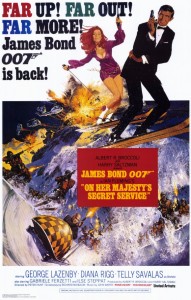 But a disengaged Connery is still vastly preferable to Lazenby who just never seemed to gel in the role. Granted a few more outings as Bond might have solidified his performance a little and given him a distinctive style, but as it stands Lazenby has the dubious honour of being my least favourite Bond in one of my favourite Bond films. Despite my general nonchalance towards the antipodean variant on Bond I kind of adore On Her Majesty’s Secret Service. In contrast to Lazenby’s kind of dorky portrayal of the character the film itself is kind of cool with a style and tone like a pure distillation of James Bond without reverting to the usual Bond tropes. Even the music is cool with the opening credits scored to John Barry’s groovy titular theme, which would become almost as iconic as the main Bond theme and a genuinely great use of Louis Armstrong. What OHMSS has going for it, more than anything else, is an unusual cadence.
But a disengaged Connery is still vastly preferable to Lazenby who just never seemed to gel in the role. Granted a few more outings as Bond might have solidified his performance a little and given him a distinctive style, but as it stands Lazenby has the dubious honour of being my least favourite Bond in one of my favourite Bond films. Despite my general nonchalance towards the antipodean variant on Bond I kind of adore On Her Majesty’s Secret Service. In contrast to Lazenby’s kind of dorky portrayal of the character the film itself is kind of cool with a style and tone like a pure distillation of James Bond without reverting to the usual Bond tropes. Even the music is cool with the opening credits scored to John Barry’s groovy titular theme, which would become almost as iconic as the main Bond theme and a genuinely great use of Louis Armstrong. What OHMSS has going for it, more than anything else, is an unusual cadence.
It is loser and freer than pretty much any other entry in the series, with Lazenby playing Bond far more amoral than Connery. He’s a bit of a fuck up, and a bit of a sleaze in the film, but it works to give Lazenby a certain edge. His complicity with shadier characters and aptitude for arrogance and petulance almost makes him feel like a forebear to the harder Bond of the modern films. He’s ably matched by Telly Savalas who plays classic Bond villain Blofeld with a lethal charm and Diana Rigg who injects a lot of energy and personality into a rather shallow character. I think if the series had continued with Lazenby we would have seen his Bond turn into a hardened, angrier, person more like Daniel Craig than Roger Moore. I think a lot of people often just remember Lazenby’s Bond as the Bond who fell in love and was subsequently widowed and forget how hard edged he could be.
Roger Moore
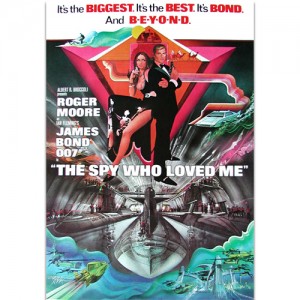 Moore is the second of the Big Bonds and it’s easy to see why people like his portrayal so much. Moore plays Bond with suave and charm, a gentleman with a gun compared to the more roughly hewn Connery and Lazenby. The Moore films are big blockbusters, bustling with ideas and straining against constricting budgets to achieve them. They are silly and goofy but they allow Moore to shine in a way no other Bond has. I’m not a fan of the Moore films, but I appreciate the craft that went into the movies and the scale and spectacle of the middle movies The Spy Who Loved Me and Moonraker. What Moore’s film aren’t are faithful to the original and Moore’s specific take on the character combined with the ravages of time mean that he only feels legitimately threatening in his first two appearances.
Moore is the second of the Big Bonds and it’s easy to see why people like his portrayal so much. Moore plays Bond with suave and charm, a gentleman with a gun compared to the more roughly hewn Connery and Lazenby. The Moore films are big blockbusters, bustling with ideas and straining against constricting budgets to achieve them. They are silly and goofy but they allow Moore to shine in a way no other Bond has. I’m not a fan of the Moore films, but I appreciate the craft that went into the movies and the scale and spectacle of the middle movies The Spy Who Loved Me and Moonraker. What Moore’s film aren’t are faithful to the original and Moore’s specific take on the character combined with the ravages of time mean that he only feels legitimately threatening in his first two appearances.
What the Moore films have is personality and even the most plodding of his films tend to at least have something vaguely memorable about them. In particular Moore probably has the strongest set of memorable villains of all the bonds. From lackies like the Jaws and Baron Samedi to main villains like the laconic Hugo Drax and the insanely over the top Max ‘MOAR POWAH!’ Zorin the Roger Moore films often feel larger than life. In fact what often scuppers Moore isn’t his characterisation but rather pedestrian direction by Guy Hamilton and John Glen. Hamilton never seemed to understand the tone of the films he was trying to make and his two Moore films feel oddly anonymous, whilst John Glen failed to understand the limitations of his aging star.
Timothy Dalton
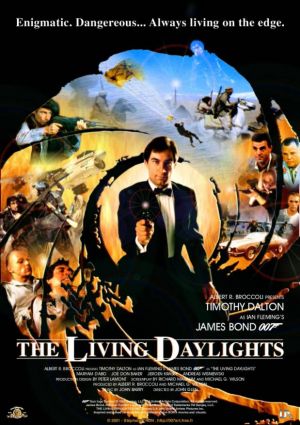 This problem was initially overcome by the casting of Timothy Dalton who had the youth and presence to make Glen’s style work. Dalton plays Bond as a steely bastard, far closer to the book than any of the other actors. When I was growing up Dalton was my favourite Bond, as I’ve grown older I’ve continued to like his performance but I’ve grown increasingly bored of his two movies.
This problem was initially overcome by the casting of Timothy Dalton who had the youth and presence to make Glen’s style work. Dalton plays Bond as a steely bastard, far closer to the book than any of the other actors. When I was growing up Dalton was my favourite Bond, as I’ve grown older I’ve continued to like his performance but I’ve grown increasingly bored of his two movies.
The Living Daylights is an odd beast because you never quite know what it wants to be. Dalton is almost a perfect fit for the role, bringing a physicality and presence to the role missing since Connery. He’s however let down by rather muddy plotting and a trio of villains who can’t match his presence. The best of them is the Russian assassin Necros. Now Necros is the latest in a long line of what I call the Red Grants, muscular, tall, and blonde, attack dogs for a physically weaker master. Red Grants appear in Thunderball, You Only Live Twice, For Your Eyes Only and Tomorrow Never Dies. None of them really match the original Red Grant of From Russia With Love, because none of them are Robert Shaw, but Necros has the most personality out of them all.
Played by Andreas Wisniewski Necros actually does a lot more than the usual Red Grants, who are usually required to have a long drawn out fist fight and then get killed by a trap door of some sort. Whether attacking a British M16 facility with explosive milk bottles, assassinating spies whilst disguised as a balloon seller or having a long drawn out fight on some wire meshing Wisniewski brings a lot of personality to a fairly anonymous role and he’s a large part of why the film works. I also mention Wisniewski because it’s always amused me that in Die Hard despite being 6 foot 4 inches tall and being built like a Viking warlord he’s forced to play the dowdy, sweatpants clad, younger brother to Karl.
Dalton’s second film, Licence to Kill just feels horribly cheap, an attempt to cash in on the grittier action movies that had become popular in the late 80s. Unfortunately Bond needs a certain element of suaveness to overcome the fact he’s kind of a psychotic son of a bitch, as such Bond is deeply unlikeable in Licence to Kill. In fact it is easy to see why a lot of people assume that the film itself, and not legal wranglings, generated the long hiatus between it and Goldeneye.
Pierce Brosnan
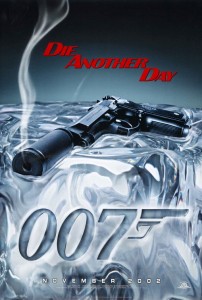 The old adage is that you either like Connery or Moore as Bond. That makes sense when you consider that until Goldeneye 13 of the 16 James Bond films had featured those actors. But why is it that that adage is still in use despite the fact that Pierce Brosnan played Bond if four films and was responsible for reviving the franchise. Even the film that everyone hated made more money than it’s possible to rationalise. Yet he doesn’t seem to be an iconic Bond in the way that Moore or Connery are.
The old adage is that you either like Connery or Moore as Bond. That makes sense when you consider that until Goldeneye 13 of the 16 James Bond films had featured those actors. But why is it that that adage is still in use despite the fact that Pierce Brosnan played Bond if four films and was responsible for reviving the franchise. Even the film that everyone hated made more money than it’s possible to rationalise. Yet he doesn’t seem to be an iconic Bond in the way that Moore or Connery are.
I think part of the problem is that Brosnan played his Bond as an amalgamation of Bondian stereotypes. He’s shades of other Bonds in a debonair package. He is fine in the role, but I can’t think of any defining character traits. I think the major problem is that the Brosnan Bond movies essentially became action movies. The problem was that aside from two sequences across his entire run Brosnan found himself saddled with really boring and uninspired action sequences. Brosnan’s first foray into the role is a fantastic debut and Goldeneye has an energy and tone that is never matched by his other films. His final film is now kind of universally loathed, and I understand exactly why, but I actually think The World Is Not Enough is a worse film than Die Another Day purely because it has no aspirations towards anything. Die Another Day is a cacophony of missed opportunities, but it has momentum and a fun villain.
Daniel Craig
I won’t talk much about Craig as I want to see how his run pans out. I will just make this suggestion. Next time you watch Casino Royale and Quantum of Solace take a break of about ten minutes when Bond crashes his car in Casino Royale. Then start the film and immediately play Quantum of Solace afterwards. You’ll be surprised how naturally the last thirty minutes of Casino Royale feel like the opening act of Quantum of Solace and the car crash also represents the point in Casino Royale were the film becomes more Bondian in general, which Quantum of Solace continues
Disagree with me? Splendid! Tell me about it.
